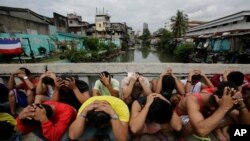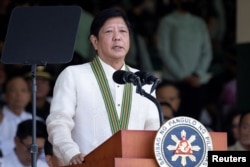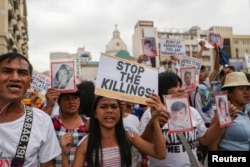On March 28, Philippine President Ferdinand Marcos Jr. announced the country was breaking off “contact and communications” with the International Criminal Court.
The announcement came after the Hague-based court rejected a petition from the Philippines to suspend its investigation into drug war killings under former president Rodrigo Duterte.
“We cannot cooperate with the ICC considering the very serious questions about their jurisdiction and about what we consider to be interference and practically attacks on the sovereignty of the Republic,” Marcos said.
“So that’s pretty much it; we have no longer any recourse when it comes to the ICC.”
Marcos’ claims that the Philippines’ hands are tied regarding cooperation with the ICC are misleading. The sovereignty of the Philippines is not being attacked; rather, the country is being asked to abide by the conditions of a treaty it freely ratified.
Duterte, who cultivated a tough-on-crime image, made the anti-drug campaign a cornerstone of his presidency, which began in June 2016 and ended in June 2022.
Duterte claimed his campaign prevented the Philippines from devolving into a “narco-politics state.”
Critics allege Duterte fueled a climate of lawlessness, in which mostly poor people were subjected to extrajudicial killings and their families were denied justice.
The Philippine Drug Enforcement Agency said 6,252 drug suspects had been killed as of May 31, 2022.
A United Nations report from 2020 estimated that tens of thousands of drug suspects may have been killed from 2016 through 2019.
Rights groups demanded that the U.N. investigate the killings, arguing the “scale of abuses reaches the threshold of crimes against humanity.”
In February 2018, former ICC prosecutor Fatou Bensouda announced a preliminary investigation into the Philippines drug war killings.
The following month, Duterte announced the Philippines was pulling out of the ICC’s Rome Statute, the treaty that established the court. That decision was effective from March 2019.
On September 15, 2021, the ICC authorized a formal investigation into the drug war killings.
The ICC investigation also covered killings committed from 2011 to 2016 in the city of Davao, where Duterte was a long-serving mayor.
The Philippines became a party to the Rome Statute on November 1, 2011.
So, does the court have jurisdiction to investigate those crimes, since the Philippines withdrew from the ICC in 2019?
Here’s what Article 127 of the Rome Statue says:
"A State shall not be discharged, by reason of its withdrawal, from the obligations arising from this Statute while it was a Party to the Statute … Its withdrawal shall not affect any cooperation with the Court in connection with criminal investigations and proceedings in relation to which the withdrawing State had a duty to cooperate and which were commenced prior to the date on which the withdrawal became effective, nor shall it prejudice in any way the continued consideration of any matter which was already under consideration by the Court prior to the date on which the withdrawal became effective.”
That, the ICC asserts, gives it jurisdiction to investigate and prosecute.
“By ratifying the Statute, the Philippines explicitly accepted the jurisdiction of the Court, within the limits mandated by the treaty, and pursuant to how the system of complementarity functions,” ICC judges said when considering the Philippines’ appeal to suspend the court’s investigation.
The ICC is a court of last resort, which means it only investigates crimes when a country’s courts are unable or unwilling to do so.
The ICC has jurisdiction over genocide, war crimes, crimes against humanity and the crime of aggression.
Did the ICC give the Philippines a chance to investigate the alleged drug war crimes?
On November 18, 2021, the ICC deferred its investigation at the request of the Philippines, which said it was conducting its own investigation into the “alleged crimes against humanity of murder.”
Article 18(2) of the Rome Statute allows the ICC prosecutor to defer to a country’s investigation of alleged criminal acts.
But Article 18(3) allows the ICC to revisit that deferral “when there has been a significant change of circumstances based on the State's unwillingness or inability genuinely to carry out the investigation.”
On January 26, the ICC granted its prosecutors’ request to resume their investigation, saying it “is not satisfied that the Philippines is undertaking relevant investigations” to adequately investigate the drug war crimes.
Rights groups and the U.N.’s former top human rights official warned the killings had been conducted with impunity or “near-impunity.”
Carlos Conde, the Philippines researcher for Human Rights Watch, said the “domestic accountability mechanisms in the Philippines have thus far been a failure,” which gave the ICC the green light to reopen its investigation.
The Philippines' justice system has not prosecuted extrajudicial killings, he said, noting that many occurred while the country was a state party to the ICC’s Rome Statute and thus fall under the court’s mandate.







